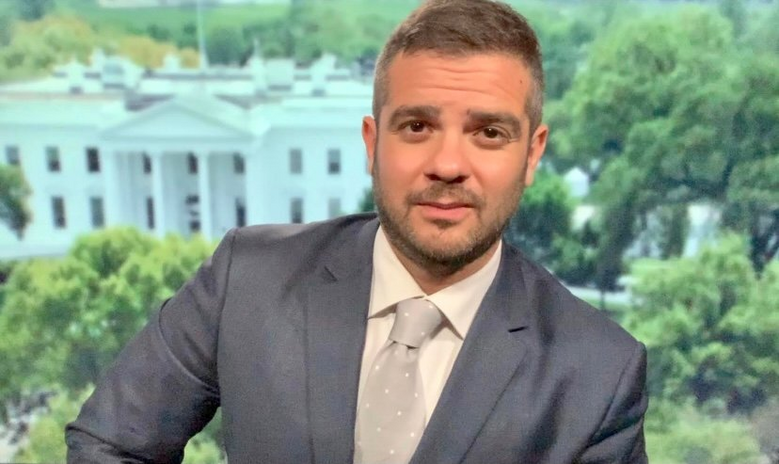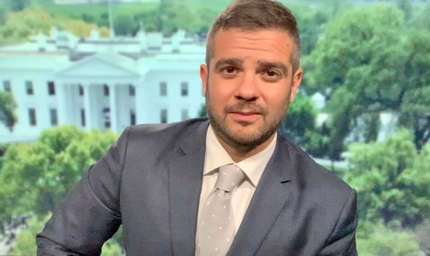Amid the chaos in Washington D.C., journalists are scrambling to get their breaking news stories out to the world. Whether it be President Trump being diagnosed with the Coronavirus or RBG’s passing, there is always something to cover. I had the opportunity to sit down with a Washington correspondent, Alexander Panetta. Not only is he working in arguably the most significant political town in the world, but he is also corresponding to the largest Canadian news network, CBC.
Her Campus (HC): How did your career in journalism begin? What lead you into this field?
Alexander Panetta (AP): The short answer is I got some lucky breaks — and the luckiest of all was meeting a few people who gave me a chance. Being a reporter was my dream job; it’s something I’d wanted to do this since I was a kid. At Concordia University, many years ago, I got involved in the student paper, and that led to a few freelance assignments for a community newspaper in Montreal. That turned into a full-time job, and eventually, a friend there introduced me to Bill Beacon of The Canadian Press, who gave me a chance to cover some Montreal Expos major-league baseball games. And that turned into a 20-year career at The Canadian Press, in Quebec City, Montreal, Ottawa, Washington and a few foreign assignments. I’ll always feel a sense of responsibility to those people who gave me a chance, by making time for young reporters. As for young journalists: Don’t be shy. Reach out to reporters, pitch ideas, ask for advice. Most people in our line of work remember what it was like trying to break into this business — and are happy to make the time.
HC: CBC is the largest news network in Canada — how did you land such an amazing opportunity?
AP: I’d been working in Washington for a few years, with CP and then at Politico, where I helped launch their Canada coverage section. A phenomenal job opened up at the CBC, and after a couple of conversations with people there I was struck by how fulfilling and, frankly, fun, the job sounded. And you’re right — it’s been great.
HC: You’re Canadian of course, but now you’re in Washington D.C. — how did that happen?
AP: I’ve been here since 2013 when I was assigned to cover Washington. I’d always wanted to be a foreign correspondent. Sadly, the number of such postings has collapsed across our industry; news organizations are shutting bureaus around the world. And the DC position is the last such foreign posting at CP. I spent a few years preparing to apply for that job, expecting it might eventually open up — so I read whatever I could about U.S. politics and history. Eventually, the position was posted, I applied, and I was thrilled to get it.
HC: What exactly do you report on as a Washington correspondent? AP: I do some TV, and some radio, but these days mostly write for our website. And there’s really two main categories of a story I usually tell. One is the American story — for example, a major bill before Congress; an opening on the Supreme Court; the presidential election; a cultural phenomenon; a major breaking event. The other is the American story as it affects Canada — for example, a new trade tariff against Canada; an oil pipeline or climate decision; a shutdown of the border; or something said in a congressional meeting about a cross-border issue. And I see those two types of stories as fundamentally different. I try to add value by slowing down the American story, which unfolds at such a wild pace that sometimes it’s hard for people to keep up — so I might do a piece, say, on the theme, “What’s the Senate filibuster; why are Democrats talking about ending it; and what effect would that have?” On Canada-U.S. stories, I do the opposite — I try covering them at a rapid pace, say, when I hear something of interest about the border, I’ll churn out a story as fast as I can. I sometimes describe the difference using a kitchen metaphor — as the difference between slow-cooking and short-order work. Meaning your value as a correspondent is to slow down a story unfolding at a frantic pace, in order to help readers catch up — that’s the U.S. story; conversely, if something comes up that affects Canada directly I try alerting people immediately.

AP: Our countries are so deeply connected that it feels like calling home from a sibling’s house. You’re not so much on the outside looking in, as sending dispatches back from a familiar place. A familiar place that people care about very much. Canada is so heavily affected by events in the U.S., so the appetite for news from here is pretty voracious.
HC: How’s the atmosphere in Washington D.C. compared to Ottawa? I assume it’s more dramatic and chaotic.
AP: It’s on another planet. Every two days, it seems you’re covering a story that would be the year’s biggest in many places. Just look at the last few days: the ground-shifting death of Ruth Bader Ginsburg, followed by the president being helicoptered to hospital, with approximately a dozen big campaign stories and scandals between those two events. It’s like a treadmill that only ever gains speed.
HC: What are the similarities and differences between politics in the US and in Canada?
AP: The biggest difference flows directly from our two different systems of government. Like many Canadian reporters, I found DC disorienting when I first arrived. Because news is happening in so many places at once: on one end of town, on Capitol Hill, in the Senate and across the Capitol in the House of Representatives, but beyond that within each party in each chamber, and even within each party there are different factions that are often at internal odds — the progressives and conservatives versus their party leadership, then, of course on the other end of town there’s the White House, and beyond that, there are federal departments and agencies that span from Maryland, through Washington, to Virginia. Very different in Ottawa. In Ottawa, a lot of the news potential flows through a single door for much of the year — literally, one doorway produces a decent percentage of the news; it’s the entrance that government members use to enter the House of Commons when it’s in session. You could talk to the prime minister, the entire cabinet, and MPs all in one place. A few meters away, there’s the opposition door. The basic difference is that the Canadian system of government creates a bit of a corralling effect, or a funnel, through which the Canadian executive and legislative branches of government flow every day, at roughly the same times. The U.S. republican system of government is more diffuse — with news suddenly and unpredictably erupting across so many additional places and you can’t be in all of them at once.
HC: Has working in Washington D.C changed the way you see US/Canada relations? Has it changed how you see the US?
AP: It’s helped me realize how distracted Washington can be. Including for the reasons I just mentioned. There are so many power centers, or centers of gravity, operating all over the place, doing their own thing, that you gain an appreciation of how difficult it is to gain, and sustain, the attention of decision-makers here. If you’re a Canadian walking into a meeting to complain about duties on softwood lumber, it might be a huge story in Canada but very few people in Washington, outside of the circle of special interests, and of lumber-district lawmakers, will have spent a lot of time thinking about this issue. That’s why I think some of the more astute foreign visitors to this city find a way to engage people in Washington on issues that *have* captured their attention, and then also bring up their own issues of concern in the meantime. Basically, they lead with the issue that packs a political punch here — and connect it to bilateral causes.
HC: News is pouring out of Washington D.C and Ottawa every few minutes — how do you manage an intense deadline?
AP: You pick your spots. That’s why I try to avoid chasing the bouncing ball in Washington day, after day, after day — and instead try standing back and saying, “Here’s the apparent trajectory of the bounce and, whenever relevant, here’s how the related issue might affect Canada.” As mentioned earlier, I’ll tell some stories at a faster pace — say, if there’s a huge breaking news event or a story with a clear Canadian news hook that nobody else has reported.
HC: What keeps you up at night?
AP: Lately, the state of the social fabric. Everywhere you go these days, you hear frightening rhetoric about how people might react to the Nov. 3 election. And an increasing intolerance of political opponents. I’ve written in different stories about how people who pay attention to eroding democracies are increasingly worried about the trajectory the U.S. is on, and has been for some time. It’s just striking how commonplace it’s become, just hearing extremely heated rhetoric and hearing such a broad swath of people, from scholars to regular Americans, articulating scenarios about threats to American democracy that would have been written off as outlandish just a short while ago. This is, by some yardsticks, the oldest continual democracy in the world — and a direct legacy of the Enlightenment. It’s an imperfect product, maybe, but it’s an important human achievement nonetheless. The US. is certainly capable of emerging just fine from whatever challenges it faces, and transmitting its legacy to many future generations. I hope.
HC: If you could give your 22-year-old self-advice, what would it be?
AP: Add more light, less heat. I’d have been a better journalist, earlier, if I’d spent more time reading books about the issues I covered — and less time reading hot takes. My advice to me would be, “Read everything you can about the subjects you cover. In your free time, too. There aren’t enough work hours in a day to do this job well. Read up on the people, the issues, the history, of the topics you’re covering.” I had this revelation once when I was sorting through old boxes and saw some of my clippings from my early 20s. I was happy to re-read some. But I was disappointed in lots of them — finding them, in too many cases, small. And I think the antidote to that is to immerse yourself in the scholarship and biographies in fields you cover.
HC: What’s the most challenging part of being a journalist?
AP: For beat reporters, whether it’s the sports beat, or the Pentagon, or the White House, or Parliament Hill in Ottawa, it’s easy to get sucked into writing for the people on your beat. For the folks you cross paths with during your working hours. Using their acronyms and jargon. Chasing the topics they care about. Forgetting the stories that ordinary people care about. And it happens — it’s human nature. You spend your days immersed in a topic, and there’s a risk you forget the outside world. It helps to give the head a shake once in a while and remind yourself: You don’t write for them. You write for everyone else.
Want to see more HCFSU? Be sure to like us on Facebook and follow us on Instagram, Twitter, TikTok and Pinterest!



